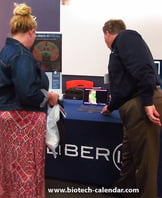The National Institutes of Health (NIH) awards the University of Arizona roughly 200 grants totaling about $100 million each year. In 2018 the numbers increased to 266 grants totaling $125,091,695. A large portion of this NIH research funding was awarded to the over 250 scientists included in the University's BIO5 Institute. Here are the top 10 BIO5 NIH grant recipients:
Principal Investigator’s Name |
Project Titles or Description |
Funding |
|
|||||||||||||||||||||||||||
|
OJO, AKINLOLU OLUEUN |
Health All of Us Research Program |
$12,000,000 |
|
|||||||||||||||||||||||||||
|
With one million participants, this will be the largest health database ever that researchers can use to conduct studies into how environment, lifestyle, and genes impact health |
|
|
|
|||||||||||||||||||||||||||
|
MARTINEZ, FERNANDO D |
Early Origins of Chronic Airflow Limitations OREX: Primary Prevention of Asthma in Children |
$7,349,719 |
|
|||||||||||||||||||||||||||
|
1st Study follows up on Subjects in the Tucson Children's Respiratory Study who are now in their mid-thirties, a critical age during which early symptoms and functional manifestations of COPD first occur. 2nd Study researchers will give a safe powder made up of detoxified pathogenic bacteria (Bronchovaxom) to infants at high risk for asthma, and determine if reduces the children’s odds developing persistent wheezing |
|
|
||||||||||||||||||||||||||||
|
BRINTON, ROBERTA DIAZ |
Brain aging and Alzheimer’s Research and Therapy |
$4,257,797 |
|
|||||||||||||||||||||||||||
|
6 different research projects regarding how the brain ages, Alzheimer’s and related dementias, as well as a study into the use of a promising regenerative medicine, Allo, which activates the brain's own regenerative ability while reducing the pathology of Alzheimer’s |
|
|
||||||||||||||||||||||||||||
|
GARCIA, JOE G. N. |
Cytoskeletal Regulation of Lung Endothelial Pathology |
$2,336,280 |
|
|||||||||||||||||||||||||||
|
Research project focused on the critical role of the endothelial cell cytoskeleton in the pathobiology of acute respiratory distress syndrome (ARDS) which affects over 200,000 U.S. patients/year with a mortality of 30-35% |
|
|
|
|||||||||||||||||||||||||||
|
BARNES, CAROL A. |
Neurobiology of Aging |
$2,246,292 |
|
|||||||||||||||||||||||||||
|
4 different projects including research into the neurobehavioral relations in senescent hippocampus, gene expression supporting successful cognitive aging, brain adaptation, and neurobiology of aging and Alzheimer’s Disease |
|
|
|
|||||||||||||||||||||||||||
|
CHERRINGTON, NATHAN J |
Southwest Environmental Health Science Center |
$1,830,476 |
|
|||||||||||||||||||||||||||
|
This center works for the advancement of environmental research related to arid environments through the organization of three main research themes: 1) Environmental Exposures in Underserved Southwest Populations, 2) Environmental Lung Disease, and 3) Adaptive Responses to Environmental Stresses. |
|
|
|
|||||||||||||||||||||||||||
|
KRAFT, MONICA |
Dysfunction of Innate Immunity in Asthma/ Advancing Severe Asthma Precision Therapy |
$1,819,856 |
|
|||||||||||||||||||||||||||
|
Seeks to demonstrate that aspects of the host response which are surfactant protein A, Toll interacting protein and palmitoyl-oleoyl- phosphatidylglycerol are dysfunctional in asthma. This could lead to therapies to resolve persistent inflammation. |
|
|
|
|||||||||||||||||||||||||||
|
GALGIANI, JOHN N |
Valley Fever Vaccine Research |
$1,703,956 |
|
|||||||||||||||||||||||||||
|
Valley Fever is a fungal infection found in the South West that causes 50,000 illnesses, and 160 deaths, each year. The goal of this proposal is to prevent this disease entirely by developing a vaccine |
|
|
|
|||||||||||||||||||||||||||
|
GRANZIER, HENK L. |
Titan in Skeletal Muscle Health/ Role of Nebulin in Muscles |
$1,626,923 |
|
|||||||||||||||||||||||||||
|
1st study seeks to understand how mutations in titin might cause muscle disease and gain insights into possible therapeutic approaches 2nd study focused on investigating Nebulin, a skeletal muscle protein that can cause the debilitating nemaline myopathy disease. |
|
|
|
|||||||||||||||||||||||||||
|
GOODRUM, FELI |
Cytomegalovirus Research |
$1,332,366 |
|
|||||||||||||||||||||||||||
|
3 different studies into viruses including two on Human cytomegalovirus (HCMV) which is a persistant pathogen infecting the majority of the population worldwide. HCMV causes life-threatening disease in the immunocompromised |
|
|
|
|||||||||||||||||||||||||||
University of Arizona Researchers Meet with Laboratory Suppliers at Bioresearch Trade show Held at BIO5 Institute:
|
RELATED ARTICLES: Arizona's BIO5 Institute: Over $1.3M in Grants for Ovarian Cancer Research UC Riverside Receives Nearly $2.5M to Fund Cancer, ALS Research |
On Wednesday, November 14, 2018 Biotechnology Calendar Inc. will host the 17th Annual BioResearch Product Faire at the University of Arizona, Tuscon. This event allows these well funded researchers to meet face to face with laboratory equipment suppliers to discuss their needs and see demonstrations of the latest lab products.
Last year, this event attracted 125 attendees. Of these attendees, 32 were purchasing agents, professors and post docs, and 25 were lab managers.
To learn more about participating in this premier life science marketing event, visit the link below:
Science professionals attend for free. Save time at the door by pre-registering.




